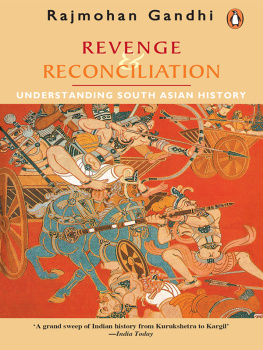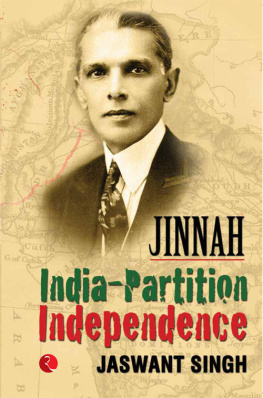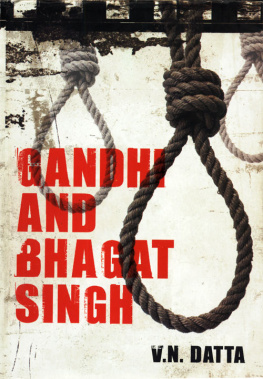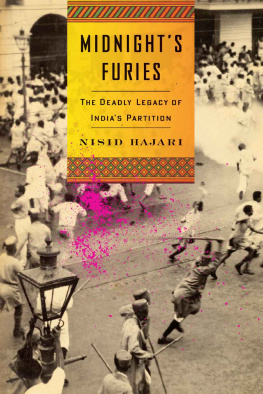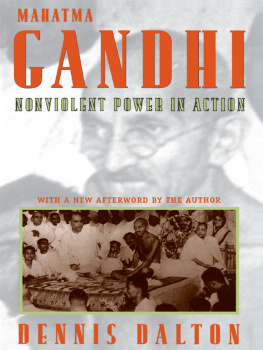GANDHIS HINDUISM
The Struggle Against
JINNAHS ISLAM
GANDHIS HINDUISM
The Struggle Against
JINNAHS ISLAM
M.J. AKBAR

BLOOMSBURY INDIA
Bloomsbury Publishing India Pvt. Ltd
Second Floor, LSC Building No. 4, DDA Complex, Pocket C 6 & 7,
Vasant Kunj, New Delhi 110070
BLOOMSBURY, BLOOMSBURY INDIA and the Diana logo are trademarks of Bloomsbury Publishing Plc
First published in 2020
Copyright M.J. Akbar, 2020
M.J. Akbar has asserted his rights under the Indian Copyright Act to be identified as the Author of this work
Images courtesy: Nehru Memorial Museum & Library
All rights reserved. No part of this publication may be reproduced or transmitted in any form or by any means, electronic or mechanical, including photocopying, recording, or any information storage or retrieval system, without prior permission in writing from the publishers
Bloomsbury Publishing Plc does not have any control over, or responsibility for, any third-party websites referred to or in this book.
All internet addresses given in this book were correct at the time of going to press. The author and publisher regret any inconvenience caused if addresses have changed or sites have ceased to exist, but can accept no responsibility for any such changes
ISBN HB: 978-93-89449-14-3; ebook: 978-93-89449-16-7
2 4 6 8 10 9 7 5 3 1
Created by Manipal Technologies Limited
To find out more about our authors and books, visit
www.bloomsbury.com and sign up for our newsletters
For Mallika,
head and heart
of my beloved family
Contents
The term professional has acquired some sombre undertones. The high priests of corporate behaviour, one hears, switch off their smiles on the early Monday bird to office, and not a flicker returns until spirits are refuelled the following weekend. What a pleasure it was to meet executives from Bloomsbury, and find that they combine a gentle, warm demeanour with careful professionalism in the difficult and demanding business of publishing. I am very grateful to Paul Vinay Kumar, who nurtured this book through the publishing process, and Rajiv Beri, managing director of Bloomsbury for their belief and commitment. My enormous gratitude to Prabir Bambhal, a friend of many decades and now eminence grise of Indian publishing, for being the shepherd towards publication. Meenakshi Singh produced a splendid marketing plan; Saon Bhattacharya and Manisha Sobhrajani worked diligently and hard checking the manuscript: thank you.
Writing is a lonely occupation; I do not have the words to describe how much of a strength my wife Mallika has been, along with my sister Ghazala and brother-in-law Lokesh; they created a cocoon of love along with our children Mukulika and Carl, Prayaag and Shanta, and their three joyous boys, Julian, Kayan and Agastya. My family has been a bulwark: Sajda, Wajda, Saadat, Hasnain, Sibtain, Arif and others in Telinipara and elsewhere. The closest friends are those visible both in the gleam of festive phases and the gloom of tough times. I have received extraordinary and sustaining affection from Sunil, Geeta, Habib, Tony, Ajit Bhai, Tapan, Prasanna, Raian, Bharat, Arif, Anil, Veenu, Devesh, Subhash, Rani, Gopal, Mohandas, Satish, Virendra, SM, Ram, Rajiv, Naresh, Suman, Sandip and so many others from the lasting club of school pals and the various passages of a multiple-career life. A heartfelt bow to all. Thank you, my friends.
A final word of deep gratitude to a book's family: readers.
Mohandas Karamchand Gandhi, architect of Indias liberation from British rule, wanted to spend 15 August 1947, the first day of freedom, in breakaway Pakistan rather than in India. This was neither tokenism nor a gesture of support for a country carved out of multifaith India in the name of one religion, Islam. It was a promise of defiance. Gandhi simply did not believe in the partition of India, and the creation of new, unnatural borders by an arbitrary scalpel in a fit of what he described as momentary madness. His immediate concern was the fate of partitions principal victims, the minorities: Hindus in Pakistan and Muslims in India. He wanted to be in Noakhali, East Pakistan, where Hindus had suffered bitterly in the 1946 riots and prevent any recurrence. Gandhi was still struggling to build hope from the incendiary debris of communal violence.
For over three decades of continuous struggle on the subcontinent, Gandhi had pursued a clear mission: the freedom and unity of India. Freedom had come, but at the cost of unity. India was split along its most vulnerable fault line, HinduMuslim differences. No one had fought the revanchist concept of an Islamic Pakistan with more conviction and consistency than Gandhi; no one had challenged its synthetic fallacies with more tenacity. For him, faith was harmony; how could it lead to such cruel discord? Gandhis pride in Hinduism lay in its philosophy of tolerance. He could not fathom why an Indian Muslim needed to be in a different country to remain a Muslim; freedom of faith was cardinal to Indias ethos, a principle that would become a constitutional commitment in united India. Gandhi had not won freedom from the British in order to deny freedom to Indians. What new rights could a theocratic idea like Pakistan offer to Indian Muslims?
By the summer of 1947, however, Gandhi knew that between the violence of faith supremacists, the helplessness of Congress leaders he had nurtured, and some careful British manipulation, he had lost the argument. But he refused to abandon his convictions. He had been betrayed by politics, but his moral certitude never wavered. On 31 May 1947, Gandhi told an ideological brother, the Pathan leader Abdul Ghaffar Khan, known as Frontier Gandhi, that he wanted to visit the North West Frontier and live in Pakistan after independence:
[F]or I dont believe in these divisions of the country. I am not going to ask anybodys permission. If they kill me for their defiance, I shall embrace death with a smiling face. That is, if Pakistan comes into existence, I intend to go there, tour it, live there and see what they do to me.
He also foresaw the terrible consequences of partition. On 20 July 1947, after the date of independence had been formally announced, Gandhi said in a prayer meeting in New Delhi:
I cannot rejoice on 15 August. I do not want to deceive you ... Indias partition has grieved me more than it could grieve you.... Unfortunately the freedom we have got today contains also the seeds of future conflict between India and Pakistan. How can we therefore light the lamps?
The ferocity of that future conflict became visible in riots and war at the very outset. Massacres accompanied partition, and in October 1947, Pakistan started a hybrid war where the formal engagement of armies was overwhelmed by barbaric terrorism. Over more than seven decades, that future conflict has become the longest continual war in known history.
Gandhi inherited his inclusive, embracing faith from his mother, Putlibai. She belonged to a Hindu sect known as Pranami, which practised what it preached: that all religions emerged from the same eternal being. Its scripture regarded the Muslim Quran to be as divine as the Hindu Vedas. Her syncretic values left an abiding, deep and lifelong influence on her son.
Gandhi was born on 2 October 1869 in a hundred-year-old, three-storey house, the residence of officials who had served the small Princely States of Kathiawar in Gujarat for six generations. Their means did not permit extravagance, but neither were they indigent. As Modh Banias, they belonged to a caste within the upper echelons of Hindu hierarchy. His grandfather, Uttamchand (or Ota) Gandhi, had risen to become the diwan, or premier, of Porbandar. When he fell out with the princess regent, Rani Rupaliba, her troops attacked the Gandhi home. An Arab bodyguard protected Ota Gandhi. Gandhis father, Karamchand (known as Kaba), born in 1822, was appointed, in succession, the diwan of three Princely StatesPorbandar, Rajkot and Wankaner. Putlibai, Kabas fourth wife, was less than half his age; the previous three had died, two in childbirth. Kaba viewed his work as a combination of administrative responsibility and social duty. There might have been as many as twenty guests for dinner on a regular basis, but Kaba did help out by peeling vegetables, while Putlibai took charge of the kitchen.
Next page
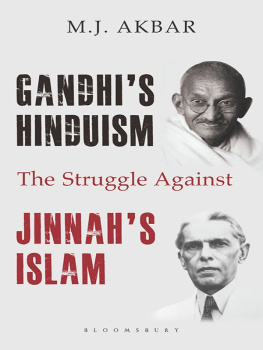
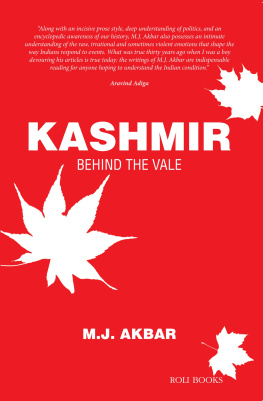
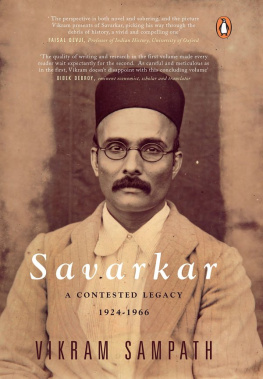


![Gandhi - Gandhi: [the true man behind modern India]](/uploads/posts/book/175484/thumbs/gandhi-gandhi-the-true-man-behind-modern-india.jpg)
